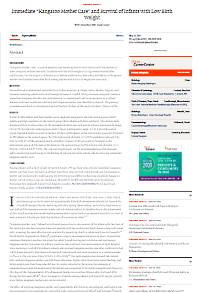Immediate "kangaroo mother care" and survival of infants with low birth weight
The study was a two-arm, randomized controlled trial set in high volume, public tertiary care units in Ghana, India, Malawi, Nigeria, and Tanzania. The babies in the immediate kangaroo mother care group started the intervention as soon as possible after birth and got an average of 17 hours per day in the Mother-Newborn ICU. In the control group, kangaroo mother care was started only after the baby was stable, with babies receiving KMC on an average of 1.5 hours per day while in the neonatal ICU. After clinically stable, babies in both the study groups received kangaroo mother care (about 19 hours/day) as recommended by WHO guidelines.The results show that immediate kangaroo mother care, which involves skin-to-skin contact with the mother and exclusive breastfeeding, started as soon as a preterm or low birthweight baby is born, dramatically improves survival. This study marks a new milestone on the road towards zero separation of the mother and the newborn. Implementing immediate KMC requires a paradigm shift in newborn care with the creation of mother-newborn intensive care units (M-NICU).
Related links:
• WHO press release
Organization: World Health Organization Immediate KMC Study Group
Year: 2021
Language: English
Web link: https://www.nejm.org/doi/full/10.1056/NEJMoa2026486





